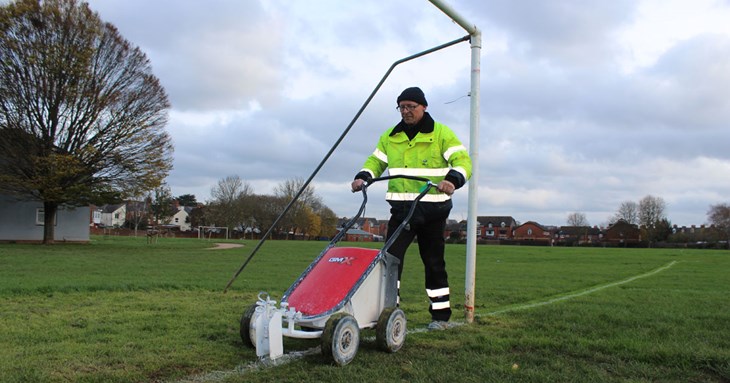Hard lines - a look at how the Council prepares its pitches for the weekend
Published: 20 November 2019

Preparing Exeter’s public football and rugby pitches for the weekend’s action is a huge undertaking, with some 7-8 miles of lines having to be marked up every week.
Luckily staff from Exeter’s Public and Green Space department are well used to the job, ensuring games on Saturday and Sunday can go ahead…weather permitting.
Lining 36 pitches requires dry weather and recent conditions haven’t been great! Sometimes pitches get done earlier in the week if there is rain expected on Thursday and Friday. Putting down a line just won’t work if the ground is soaked.
John Coles, who is one of the team responsible for marking out the pitches, said: “We do get an awful lot of rain which causes a lot of damage to the pitches and sometimes the lines are unmarkable. But we have to get some sort of line down, so we grin and bear it and push on through.”
Marking the lines is a bit of an art-form as many football club volunteers know. First the grass needs to be cut along the lines of the pitch and then the pitch marker follows on behind to make the lines as bold as possible. Doing a good, efficient job means sticking to a strict order in which parts of the pitch are done first and last.
The City Council has four staff marking the lines every week during the football and rugby season, with one cutting the grass every ten days. A full-size pitch requires 570 yards of lines to be painted, while a youth pitch is 400 and a mini pitch 140.
Additional staff are pulled in twice a year to spike the pitches using a tractor and it’s all hands on decks at the start and end of the season to put up and take down the goal posts. All in all, it takes around 1,600 to 2,000 hours of labour to keep the pitches playable.
Cat Chambers, Operations Manager said: “The team take great pride in maintaining the 36 pitches across the city. Maintenance is scheduled around the weather wherever we can, but unfortunately we are not always able to prevent the weather from setting the schedule back.
“Our biggest challenge is ensuring that the pitches stay in a playable condition for the entire season, which is a hard task with no specialist drainage to help. Professional clubs like Exeter City Football Club have specialist drainage which allows heavy rainfall to drain away much quicker.
“Consequently on our pitches the heavy plant and equipment used to cut the grass can only do so when the ground conditions allow. If there is too much rain, our tractors would do considerable damage to the pitches and leave them unplayable in a very short space of time,” she added.
